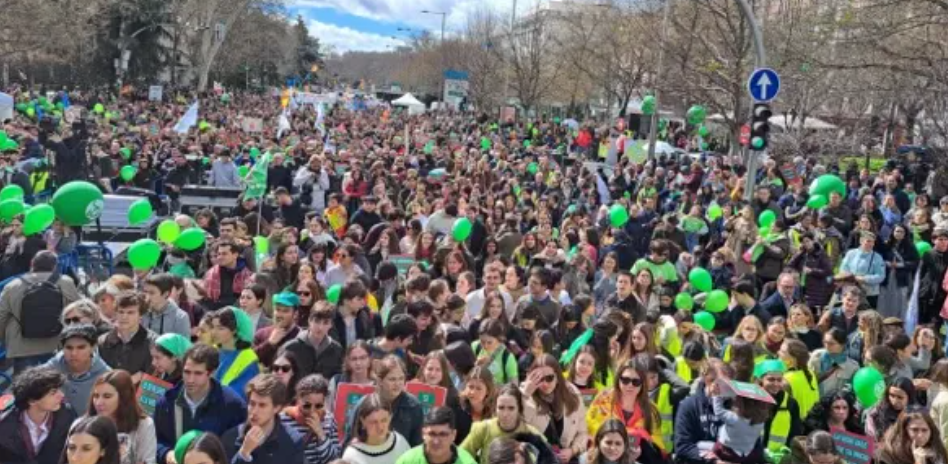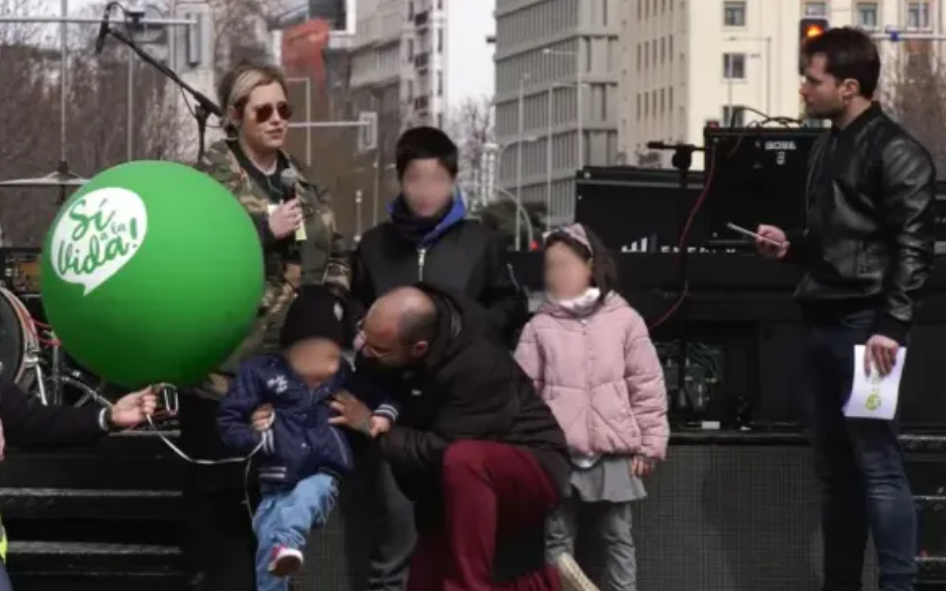The event concluded with releasing balloons into the sky and a live ultrasound of a baby at 25 weeks, whose beating heart was all that could be heard.
(NCR) In a festive atmosphere, thousands of people took to the streets of Madrid, Spain, on Sunday to participate in the annual March for Life with the theme “Yes to Life” in an event that featured powerful testimonies.
“It’s time to unmask the lies, horrors, businesses, and ideologies that sustain the culture of death and assume responsibility for repairing, healing, and making possible the culture of life and true progress,” the organizers of the pro-life event emphasized in their manifesto for the event.
Before the start of the march, the president of the Spanish Federation of Pro-Life Associations, Alicia Latorre, told the media that the objective of the march is to say “yes” to life especially “at this time when there are special attacks, not only by the laws but also against those who defend life.”
Latorre charged that “they want to turn into rights acts that are objectively perverse and that benefit no one. Not only do they take the lives of the unborn or the sick who are at the end of their life, but they also scar every person who participates in these acts and also society.”
[Click here to subscribe to Pregnancy Help News!]

their pro-life convictions. Crédit: Nicolás de Cárdenas/ACI Prensa
Some of those attending the march carried banners that read “Abortion is a crime disguised as a solution,” “The size of your body doesn’t take away your rights,” “Life is valuable from its beginning to its natural end,” and “Praying is not harassment.” A group of participants marched behind a banner with the line from Luke’s Gospel “Blessed is the fruit of your womb.”
At the end of the march route, a stage was set up on Paseo de la Castellana, Madrid’s main thoroughfare, where the manifesto was read and two powerful testimonies were given.
‘Just because life isn’t easy doesn’t make it any less beautiful’
Paloma Zafrilla is the sister of Carlos, a young man who is 96% disabled. “He’s like a 6-month-old child,” Zafrilla told the assembled crowd. “He is 26 years old, but he doesn’t walk, he doesn’t talk, he doesn’t communicate. He is exactly like a baby. What he does do is smile and complain when something is bothering him,” she explained.
When her brother was diagnosed at 7 months old, his parents were pressured to not have more children “because they didn’t know how they might turn out, if the diagnosis were to be repeated” and they even told them “that it was very selfish to bring children into the world who could live with this misfortune, with this tragedy,” Zafrilla said.
“They even told me how could we take care of little Carlos, that in the end there was no quality of life. I can only assure you that there is no greater life than what is in my house. And especially everything is due to my brother,” she recounted, while also acknowledging that living with a disabled person isn’t easy.

Nevertheless, she added: “Just because life isn’t easy doesn’t make it any less beautiful, of course. And in this case it is quite the opposite. It’s much more fun. And it makes you look at everything with a much more special perspective,” she said to the resounding applause of those present.
Before concluding her remarks, Zafrilla observed that “a life is never less of a life according to what your abilities are, because we are not machines and our value is not based on what we produce.”
Tweet This: "Just because life isn’t easy doesn’t make it any less beautiful" - Thousands took to the streets of Madrid for the March for Life in Spain
‘Half a heart trotting like a horse’
Clara and Diego, along with their three children, also gave their testimony. Their youngest child, Felipe, was diagnosed at 20 weeks with congenital heart disease (hypoplastic single ventricle syndrome). His mother stated that she and her husband were told that the boy wasn’t going to make it to birth.
During the first ultrasound at 6 weeks, Clara recounted, they heard the baby’s “half heart trotting like a horse.” When the parents were told of the diagnosis, they were given “a short and bad, catastrophic life prognosis,” she said.

Throughout the pregnancy, the doctors asked them if they were prepared “because it was going to be quite a complicated life,” to which Clara commented: “I think we can all say that we have complicated lives, regardless of whether there is an illness or not. And in this case, yes, it has been complicated, but full of joy.”
However, the terrible outcome didn’t materialize and the determination of Felipe’s parents made the doctors work hard to save the child. “They went all out,” Clara acknowledged, to the point that this case led to the first child organ transplant being performed in 2021 with the donor in asystole, a type of cardiac arrest and the blood type being incompatible.
Regarding her older children, Clara says proudly: “They are prepared for the suffering, the illness, and the death they know can come. They are prepared for that as well as going to the park.”
Clara concluded her remarks by encouraging everyone to overcome the fear that arises in these situations: “It paralyzes you. But any decision based on love, which is to pursue life, is well made. You are a good mother and you are a mother, even if your eyes don’t see that ultrasound because they don’t want to show it to you, even if your ears don’t hear it, you’re still a mother."
The event concluded with releasing balloons into the sky and a live ultrasound of a baby at 25 weeks, whose beating heart was all that could be heard.
Editor's note: Reprinted with permission from the National Catholic Register – www.ncregister.com.






